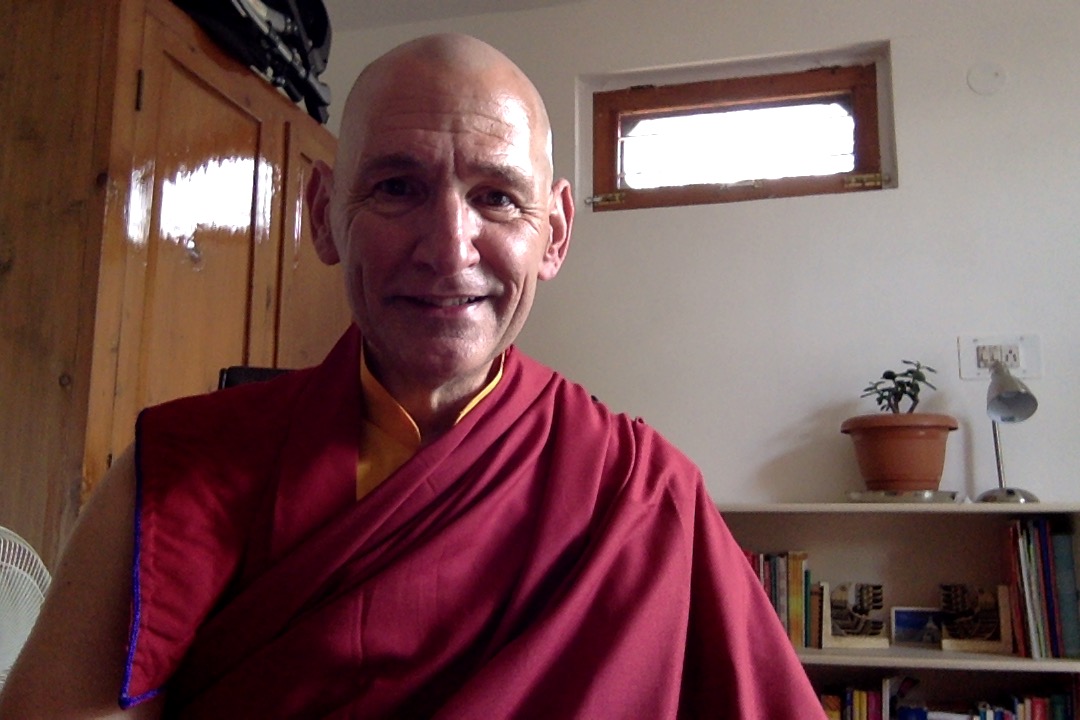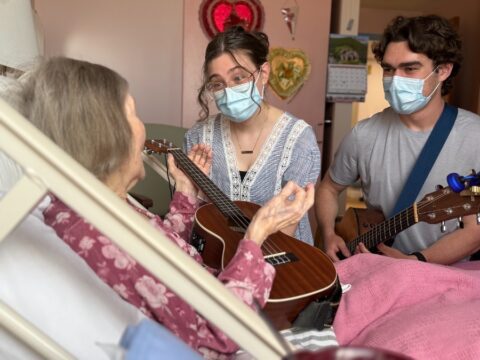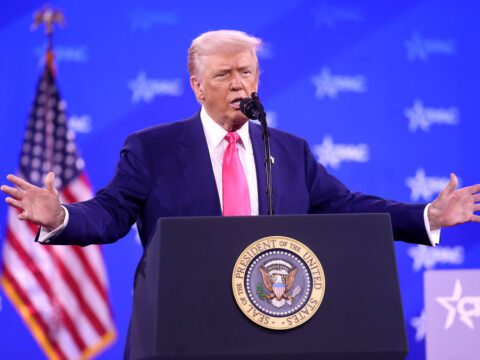Jeff Braff is a chaplain, or spiritual care provider, at St. Michael’s Hospital in Toronto. He’s also an ordained Buddhist monk and a retired infectious disease epidemiologist. He is currently pursuing his doctor of ministry at Regis College, researching how spiritual care providers can better support hospital staff who work in palliative and intensive care units and frequently deal with death. He also still works as an epidemiologist part time on a research ethics board.
He spoke with Emma Prestwich.
Emma Prestwich: I know as chaplains you provide both spiritual and emotional support, and the emotional aspect, I imagine, is something that lots of people seek out. Have people come to you in the last several months with spiritual needs? How often are you called to invoke that aspect of your job?
Jeff Braff: That’s what we do all the time. One of the things that you have to be prepared to do as a chaplain is to deal with people where they are, and work with what they have. It’s not about you, it’s about them, and somebody who hasn’t been in a church in 50 years and is confronted with the immediacy or the relative immediacy of death and dying, for example, may not have a specific religion, but may have spiritual needs.
Somebody who’s dying from stage 4 cancer, for example — What you’ve got is a situation where people are facing their own mortality. Sometimes you have the opportunity to prepare for your own death because you have a relatively long time with which to deal with it. With COVID, you may not have that. With a car accident, you may not have that. Some folks with COVID have come into the hospital and have passed away within 24 or 48 hours. In situations like that, it’s always left to deal with, where you can, the folks who are left, the loved ones, and increasingly, in situations like that, the staff, which is a big concern of mine. Hospital staff, doctors, nurses, respiratory therapists, folks like that who are dealing with these kind of things day in and day out, over and over and over again, it takes a toll on them, and we have to be prepared to deal with the issues that staff have too.
More on Broadview: How churches can help heal the healers
EP: You’re a Buddhist. What drew you to that particular faith?
JB: You mean in this lifetime? That’s the joke I use. I had always had an interest in Buddhism, and when, maybe 40 years ago, I started exploring it, I found that it was a totally appropriate way to live one’s life. Like any religious tradition, you can live according to its philosophy and not necessarily believe in the rites and rituals, what somebody has called the hocus-pocus of religion, but live the purity of the philosophy, and I found the purity of the philosophy to be very great, and the philosophy itself to be the perfect philosophy for the way I want to live my life. Even though I grew up in a Christian household, I was very turned off by what I regarded as the dogmatism of many Christian faiths and I felt much more comfortable approaching Buddhism as a philosophy and as a way of life and as a faith.
EP: You’re a monk as well. Is there a process for becoming a monk?
JB: When I retired from my full-time job the first time, I had the opportunity to study Buddhism seriously in India for two-and-a-half, three years and was ordained there, after training and studying. But it’s not unlike being in a seminary for a priest or a minister in the Christian faith.
EP: How does being a monk guide how you live your life now?
JB: In some ways it pervades what I do in the sense that it allows me to concentrate on what I consider to be the two most important parts of Buddhist teaching, which are the virtues of wisdom and compassion. Buddhist teachings are called the dharma. Living the dharma is basically what I try to do. I don’t know how successful I am, but I try to do it. Part of the living the dharma is being compassionate and having what’s called “right work.” And I figure this is right work, being a spiritual care provider, a chaplain to all people. If I were still in India, I’d be living in a monastery and spending a good part of my day doing monastic things in community like chanting and meditating. I still do that to some extent, but I also work in a hospital and do things at the university and work as a chair of a research ethics board, so I’m busy doing things that are part of what Buddhists consider to be “right work.”
When I told my teachers in India that I thought I wanted to spend my time being a chaplain in a hospital, especially around dying people, because Buddhists regard death as the most important moment of life, they didn’t understand what a chaplain was, because it’s something that’s really not known in Tibetan Buddhist circles. I explained it to them — and these were basically all Tibetan monks. Basically what they said was, “absolutely. What you’re doing is living the dharma, living the teachings of the Buddha by doing this sort of work.” So I think by being ordained and being a monastic, it makes it easier for me to concentrate my efforts in what I do as work and how I live my life. It gives me a focus that I might not ordinarily have.
EP: In your role as a chaplain, do you speak to that with people? Do they know which faith tradition you’re coming from?
JB: If they ask me, I’ll tell them. I worked for a year at the University of California San Francisco hospital, and I was on call one night, and I got called at 2:30 in the morning to come to the emergency room. A gentleman wanted to see a rabbi. At 2:3o in the morning, it’s kind of hard to find anybody, so I went down to the emergency room and I introduced myself to the gentleman, and I said, Mr. So and So, hi, I’m Jeff, I’m the chaplain, and he says to me, “are you Jewish,” and I said, no, I’m sorry, I’m not, and he says “what are you?” He was kind of scared and worried because he had had some cardiac problems. I said, “well, I’m Buddhist.” He looked at me for a minute and he said, “That’s OK, that’s the next best thing.”
So most people are fascinated by it or appreciative of it. Nobody so far has been turned off by it and said, I don’t want to see you because you’re not Christian, or Catholic or Muslim. I’ve not run into that. I fully expect to over the course of doing this at some point, but that’s OK, because again, it’s not about us, it’s about them.

EP: Can Buddhism be used to understand the pandemic?
JB: Well, yes and no. It depends. Now this is where you get into some of the things where you talk about Buddhism as a religion or Buddhism as a philosophy, as just a way of life. One of the things that Buddhism adapted from the Indian traditions that were around before Buddhism existed was something called karma, which is the law of cause and effect. When bad things happen to you, that’s your karma, that’s created by something that happened in a previous lifetime, and people have challenges accepting that, in the same way that Christians have challenges in accepting or explaining why bad things happen to good people. Karma is the Buddhist equivalent of theodicy, both of which are challenging to me personally. When somebody asks me why a bad thing has happened to me, I’ve never done anything bad in my whole life, the answer I tend to give is, “I don’t know and I don’t know that anybody knows, but let’s deal with it the best way we can.” Some questions are just not answerable. Intellectually, you can accept theodicy or karma, but viscerally, when you’re dealing with someone who’s got a three year old who’s dying from brain cancer, you can’t do that. I’m not convinced that any one religious belief or religious system has the answer.
EP: What kind of work were you doing as an epidemiologist?
JB: I worked for a large healthcare system in the States for a number of years and I was doing a fair amount of research and research administration and I was responsible for ensuring the safety of folks in clinical trials. The system where I worked had thousands of folks enrolled in a number of clinical trials and my job was to ensure that these people were protected as well as possible when they were involved as research subjects. It was a very macro kind of a job. I find that spiritual care is a very micro kind of a job in the sense that you’re dealing with one person or a small group of people experiencing a challenging situation at the same time.
EP: Epidemiologists are in the spotlight right now as they’re trying to figure out this disease and how it’ll affect people. How do you feel about the role of epidemiologists in this pandemic? Do you feel bad for them because they’re trying to map something out that’s ever changing?
JB: Most of my training is in public health. One of the challenges that public health practitioners have always had to deal with is the politics of health as opposed to the science of health and clinical medicine. The understanding for the longest time has been that public health doesn’t decide policy but it informs policy. Now, we’re beginning to see that public health should be the deciding factor in what healthcare policy should be. Look at what’s happening in the States with how COVID is being handled there and how it’s being handled here. One of the reasons that it’s as effective as it is in this country is because as least up until now, the politicians have generally listened to the epidemiologists. That hasn’t been the case in the States. The politicians have listened to themselves. So this is, if you will, a realtime experiment in the efficacy of public health and we’re seeing the results of that experiment when you look at the numbers in the States compared to the numbers in Canada.
Emma Prestwich is Broadview’s digital editor.
I hope you found this Broadview article engaging. The magazine and its forerunners have been publishing continuously since 1829. We face a crisis today like no other in our 191-year history and we need your help. Would you consider a one-time gift to see us through this emergency?
We’re working hard to keep producing the print and digital versions of Broadview. We’ve adjusted our editorial plans to focus on coverage of the social, ethical and spiritual elements of the pandemic. But we can only deliver Broadview’s award-winning journalism if we can pay our bills. A single tax-receiptable gift right now is literally a lifeline.
Things will get better — we’ve overcome adversity before. But until then, we really need your help. No matter how large or small, I’m extremely grateful for your support.
Jocelyn Bell
Editor/Publisher















Thank you for this interview. It is enlightening and enriching in content and Jeff’s work and from the profession he has enriched further from his time in India..
Thank you Broadview.
When somebody asks me why a bad thing has happened to me, I’ve never done anything bad in my whole life, the answer I tend to give is, “I don’t know and I don’t know that anybody knows, but let’s deal with it the best way we can.”
As someone who grew up with a Christian background, your first answer should have been Romans 3:21-26. We all have sinned and cannot justify ourselves before God. God needs to justify us. In human terms we cannot answer pain and suffering, we live in a fallen world, sin is the dominant force of this world. Faith and trust in God is the only way we can deal with life.
If we look at the true Buddhist view of karma, only good people can be rewarded and have a peaceful life. So a Buddhist response basically says “It’s somehow your fault”.
Christianity does answer this question. To know evil we need to know what good is. What is good? Luke 18:19 Jesus states “God is good”, and implies He is God. God loves us enough not to inflict harm to us, and if He is perfect, He makes no mistakes.
Colossians 2:7-8 answers God’s view of philosophies, which Buddhism tries to follow.